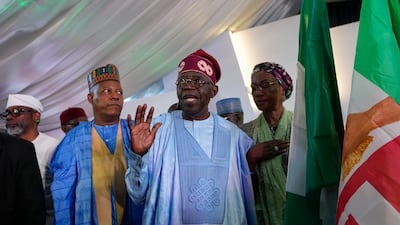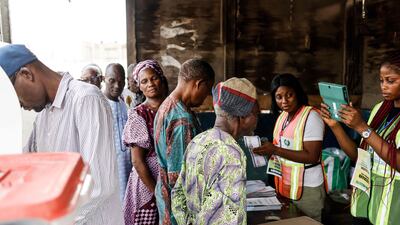Nigerians cast votes on Saturday to elect a successor to President Muhammadu Buhari, with many hoping the next leader will steer Africa's most populous nation and biggest economy on a new course after years of worsening violence and hardship.
By evening, some polling stations were already counting ballots, while voting was still going on at others and had not taken place elsewhere.
The electoral commission said the official results could be expected late on Sunday.
Polling stations were scheduled to open at 8.30am, although the start of voting was delayed by several hours in some areas because elections officials were late.
“We are still waiting on them as you can see. I'm here and everyone else is here. So I'm eager to vote, to cast my vote, to perform my constitutional right,” said Daniel Kessy, who was among those waiting to vote in the city of Kano.
The main candidates in the most open contest since Nigeria switched from army rule to democracy in 1999 are two political veterans from the two main parties and a candidate from a minor party who opinion polls suggest has a chance thanks to support from young voters.
Mr Buhari, a retired army general, is stepping down after serving the maximum eight years allowed by the constitution, having failed to deliver on his pledge to bring back order and security across Nigeria, Africa's top oil-producing nation.
More than 93 million people are registered to vote for the next president and members of the National Assembly.
Officials from the Independent National Electoral Commission cited technical problems with a new biometric anti-fraud voter accreditation system, the late arrival of vehicles to transport them and the absence of voter registers as causes of delays.
“It is frustrating that Inec are not prepared for us. All we want is just to vote,” said Sylvester Iwu, who was among a large crowd waiting at a polling station in Yenagoa, the capital of Bayelsa State in the southern oil-producing Niger Delta.
About 176,600 polling stations were scheduled to be open between 8.30am and 2.30pm. In past Nigerian elections, voters in some areas have complained that polling stations opened hours late or not at all.
The run-up to the vote has been marred by violence, a pattern seen in previous Nigerian elections. The killing of a senatorial candidate in the volatile south-east region on Wednesday was the latest in a series of serious incidents.
The election comes as Nigerians are struggling to cope with a shortage of cash caused by a botched plan to swap old bank notes for new ones. The shortage has wreaked havoc on people's daily lives and led to violence at banks and cash machines.
The new president will also have to grapple with problems ranging from high inflation, deep poverty and energy shortages, to an Islamist insurgency in the north-east, industrial-scale oil theft in the south and rampant crime everywhere.
For the election, land borders were closed, soldiers were patrolling the streets in several states and movements were restricted in an effort to boost security.
The main contenders in the race are former Lagos governor Bola Tinubu, 70, of the ruling All Progressives Congress, former vice president Atiku Abubakar, 76, of the main opposition Peoples Democratic Party, and former Anambra State governor Peter Obi, 61, of the smaller Labour Party.
Mr Tinubu and Mr Abubakar are both political heavyweights with decades of networking behind them and bulging campaign coffers. Both Muslims, Mr Tinubu is an ethnic Yoruba from the south-west and Mr Abubakar is a Fulani from the north-east.
Mr Obi, a Christian from the Igbo ethnic group, has less of a political machine behind him but has used a slick social media campaign to generate huge enthusiasm among young voters, with some even calling themselves the “Obidients”.
Nigeria has a long history of electoral fraud and violence, though its polls have been getting gradually cleaner in recent cycles. The presidential candidates and parties pledged on Wednesday to support a peaceful and transparent process.
Inec says it has introduced new technology and procedures to ensure this election is free and fair, such as a Bimodal Voter Accreditation System that will identify voters using biometric data.
The commission says mobile phones are not permitted in voting booths because in the past people have used them to take photos of their ticked ballot papers to show to candidates who have offered to pay for their votes.
Despite such precautions, analysts have warned there were still risks from the dearth of cash, which could make hard-pressed citizens vulnerable to vote-buying by candidates, and a shortage of fuel that could make it hard for the electoral commission to send staff and equipment to all areas.























